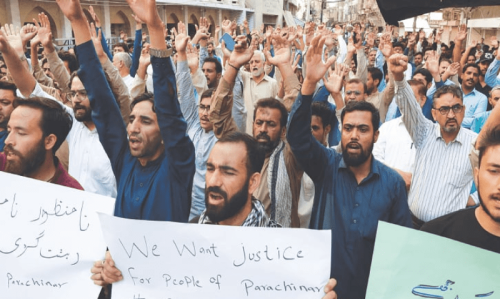IT’S that time of the year again. Down the rabbit hole we must go, exploring the recesses of the mind that is ruling Pakistan — or at least the civilian part of it — to try and figure out, what is Zardari thinking?
He’s had much to think about lately.
Team PPP has taken some serious hits in recent days. One prime minister’s been knocked out, another’s chance scuttled before he could drink from the poisoned chalice and a third is likely to face intense judicial scrutiny straight off the bat.
Power riots have intensified across swathes of the country, encouraged by an opportunistic PML-N. A handpicked central bank governor has strayed from the official script and admitted the unsustainability of the present economic policy. And the Americans have all but given up, their frustration and disappointment with the PPP increasingly public.
Through it all, Zardari hasn’t said much. The odd platitude here, the old slogan there, that’s about it.
But his mind will have been ticking, figuring out the next step in his game plan for survival, and now, reelection. Some of the choices he’s made can appear puzzling.
Back in January, when the Supreme Court reactivated the NRO issue and tried once again to get the Swiss letter written, Zardari’s strategy was fairly simple: weather the storm.
So as good ol’ YRG stood up and delivered a repeat performance of his memogate role in Swissgate, it made sense to declare that the PPP would quietly accept whatever fate the Supreme Court had in store for him.
After all, the boss wasn’t being directly targeted.
But then Bahriagate happened and a delicious opportunity presented itself: take the fight to a tarnished judiciary and hang on to a PM who had served his party loyally.
Zardari chose to do neither.
While it’s not surprising that Zardari allowed his prime minister to sacrifice himself — the admiring tone in which the party faithful had begun to speak about Gilani would have caused some consternation — not taking on the court seemed like a dangerous gamble.
In this game, once blood has been tasted, they always come back for a second, even bigger, bite. So why didn’t Zardari strike when he could and thus risk being struck against himself later?
Another puzzle: the PPP’s deteriorating relationship with the US.
Back in 2007, had it not been for the Americans’ insistence, the PPP would have found itself shut out of power by Musharraf and his allies.
Fast forward five years and the Americans have given up. It’s not just the corruption and the incompetence that has exasperated them but the inability to deliver on anything. Broader and deeper ties with the civilians were desired by the Americans — and probably still are — but Zardari doesn’t appear particularly interested.
The Nato/Isaf supply route closure sums up the problem: everyone — everyone in a decision-making position and guided by common sense, that is — agrees that an extended closure is not in the interest of Pakistan, but try finding anyone willing to own that decision publicly.
Here, then, would seem to be an opportunity for Zardari. His personal approval ratings are so low that he could risk a public backlash were he to try and convince the public of the merits of reopening the supply route.
And in any case, the PPP’s base in interior Sindh and southern Punjab is hardly animated by issues of foreign policy and supply routes.
Zardari’s — and democracy’s — potential reward, though: renewed American support for the civilians at a time where other institutions inside Pakistan are upping their anti-democratic games.
And yet Zardari turned up at Chicago asking what the Americans could do for him when they were expecting to hear what he could do for them.
So what is he thinking?
The answer, unhappily, is a familiar one. One, Zardari’s obsession with proving that he can drag this government over the finish line — completing its term — continues to dominate all else. Two, Zardari cares about only Zardari. And three, Zardari’s world begins and ends with domestic politics.Combine those three elements and you have answers to all the vexing questions.
In Zardari’s scheme of things, Gilani’s bravery was neither a source of much concern nor did it elicit much admiration. Yes, the court has ventured deep into the realm of politics. But it hasn’t gone for Zardari himself yet — so it can do what it likes for now.
Zardari’s goal is simple: the PPP train will pull up at the electoral station come what may. Friends and allies may get picked off en route, but as long as Zardari is on board at the final destination, it’s a job well done.
The same goes for ties with the Americans. In 2007, the PPP was locked out of power and the Americans held the key. Now, Zardari is king of the castle and he’s charted out his plan for future success.
Zardari is all about the deal. Biting the bullet in the name of the larger national interest is a non-starter and while he’s willing to risk the army’s ire, he can’t see what’s in it for him to stabilise a relationship no one else is willing to save.
Besides, his universe is consumed by the map of domestic politics. Winning seats, adjusting others, aspiring to some more — none of that leaves much time for statesmanship, saving Pakistan or doing the right thing.
The Zardari of today is the same as the Zardari of a couple of years ago.
Make sure the finish line is crossed, whatever the casualties suffered along the way. Think of little more than himself.
And obsess over the minutiae of domestic politics. That’s the Zardari strategy. And it looks like we’ll have it suffer it a little longer still.
The writer is a member of staff.
cyril.a@gmail.com
twitter: @cyalm











































